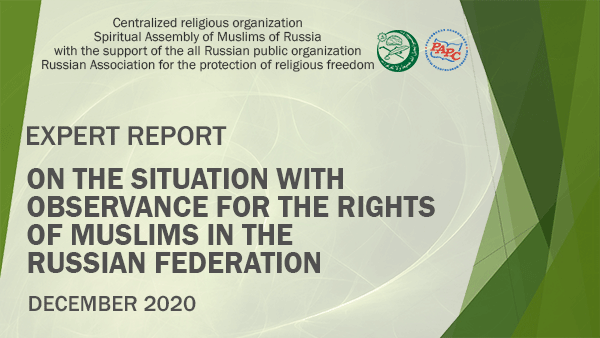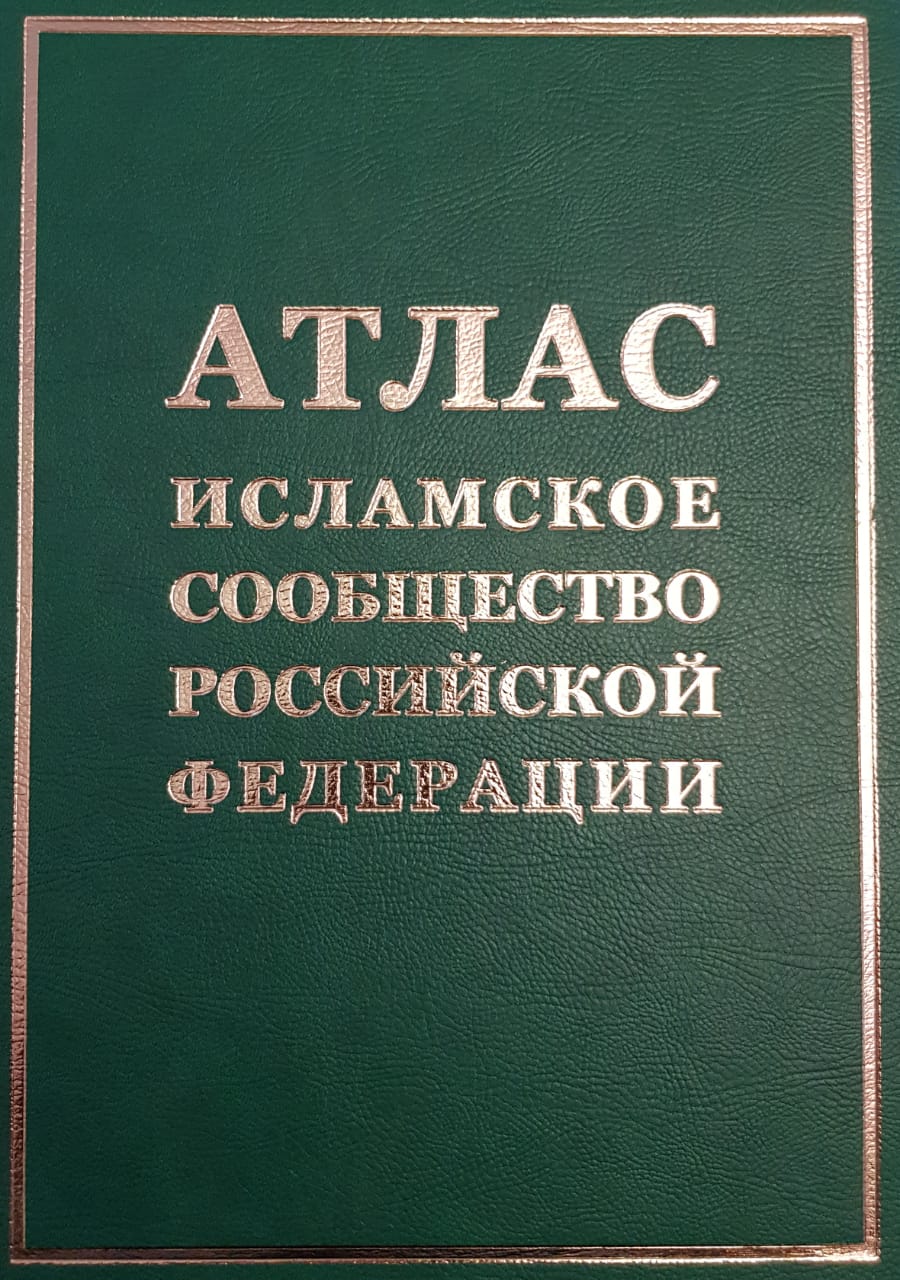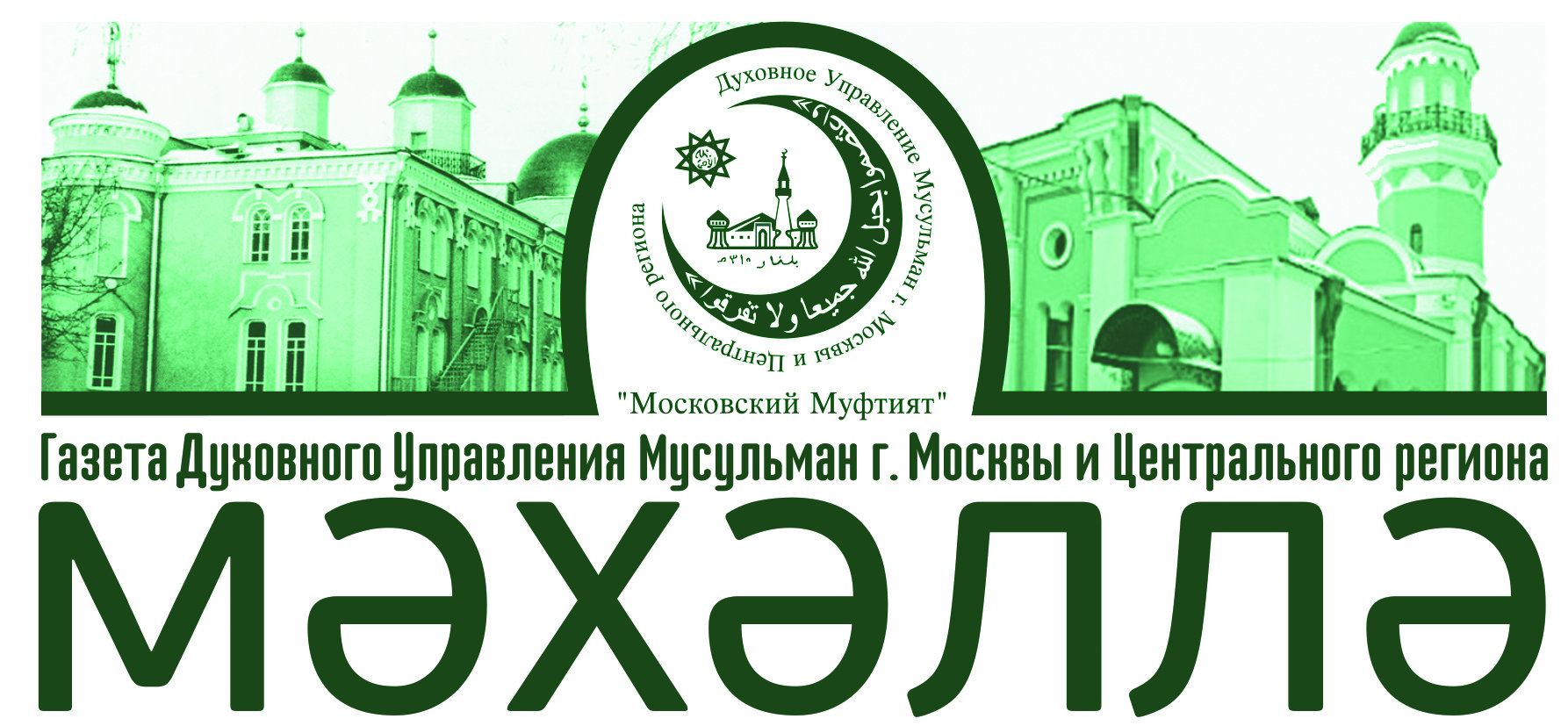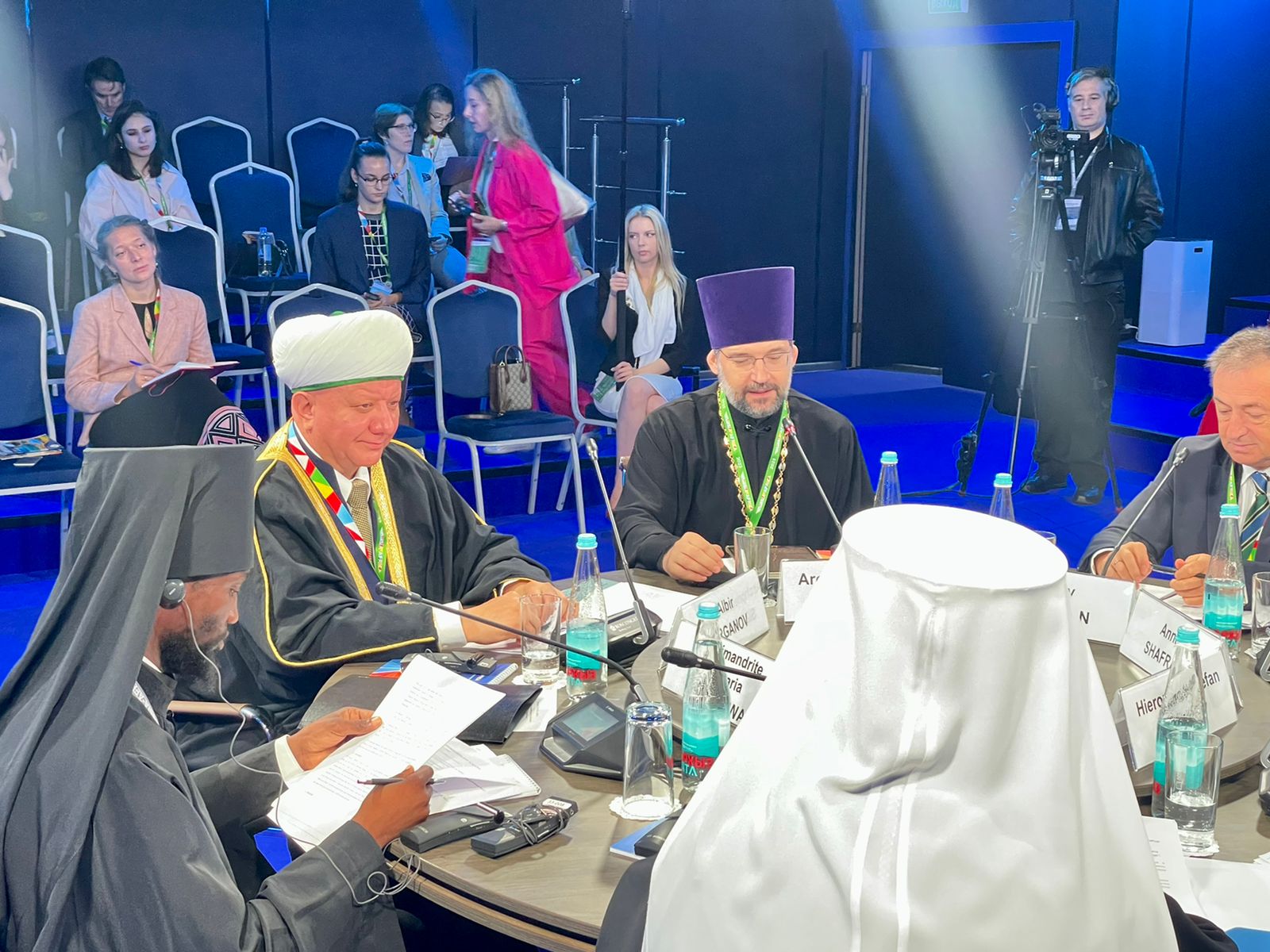Dear participants, Your Eminence, Honorable brothers and sisters!
Bismillah al-Rahman al-Rahim! In the name of Allah, the Most Gracious, the Most Merciful!
First of all, on behalf of the Spiritual Assembly of Muslims of Russia and Russian Muslims, I would like to thank the organizers for inviting me to participate in the Humanitarian Forum within the Second Russia-Africa Summit. Today, Northern Palmyra has turned into the heart of friendship and center of building bridges between states, nations and continents. People of different countries, cultures, languages and religions are gathering here at one table to discuss how to make our world, our planet, our common home safer, more stable and prosperous. As our prophet said, “...Be merciful to those who are on the earth, and the One Who is in the heavens will have mercy upon you“.
Naturally, such a thorough dialog is impossible without a frank conversation about our spiritual life, our faith, and our desire to do good and create, to make the world a better place. That is why I believe that the topic of our today's meeting – The Religious Component in the development of African Countries in a Rapidly Changing World – is in demand more than ever. There is no and cannot be any alternative to interreligious harmony, whereas the importance of this kind of harmony is obvious to anyone, regardless of religious beliefs. I am confident that our continents – Africa and Eurasia – with their rich diversity of cultures and religions, experience of cooperation and settlement of contradictions, hold the keys to stability on the whole planet. I thank the organizers of this forum for choosing such a relevant agenda.
It is symbolic that we have gathered here on the Day of Ashura which is an important religious date for Muslims all over the world. It is the day when each of us should reread the pages of ancient wisdom, do something good to our relatives, friends, children, and give time to ourselves, to stay in dialog with our own soul, cleansing it from doubts and concerns. All this is especially important now, when the world is rushing forward, and changes take on us whether we want them or not. We have all recently witnessed a series of planetary changes that have affected all walks of life and all religions. I will not be too wrong to say that there is a universal struggle against the Absolute Evil, Iblis and his satellites, to build an equitable and truly multipolar world order where all communities have an opportunity to thrive and live in harmony, without dictatorship and subjugation. “O people! Indeed, We have created you from a male and a female, and made you into nations and tribes so that you might get to know one another. Verily, the most honorable of you in the sight of Allah is the most righteous of you. Verily, Allah is All- Knowing, All-Aware” (Quran, 49:13). These words from the Quran emphasize that there is no room in Islam for hatred or discrimination based on race or ethnicity. The traditional Abrahamic religions are challenged today with an unprecedented level of threats. By undermining traditional values Iblis is trying to corrupt, turn all people into an animal herd, and then destroy, exterminate the human race. Our common task is to fight back united!
These days, the Muslim community makes up a quarter of the world's population – 1.9 billion people. Muslims live in every region, from Indonesia, where they are over 230 million, to the United States, where our co-religionists make up only about 1 percent of the total population (3.5 million). We live under different circumstances: some of us are in prosperous communities, while others face incredible hardship. But regardless of our circumstances, we all remain part of one big family, united by our faith in Allah and following the teachings of the Prophet Muhammad, peace be upon him.
/ Let me share our vision of the situation in Africa. As you may know, currently the continent has more than 1.3 billion inhabitants, which number is expected to double by 2050. Africa is a vast continent of more than 30 million square kilometers, without the Sahara; and it is home to many different cultures, religions and beliefs. Despite the differences, Africa enjoys unity through shared values, identity and historical heritage. This creates a special bond between our continents. The African continent is of great importance to Al-umma Al-Islamiyya and its role cannot be overemphasized. Today, Africa ranks second after Asia as the most Muslim continent. Meanwhile, North Africa is one of the oldest historical areas of the Islamic world, whereas Tropical Africa is the region where Islam is spreading the fastest. The early 20th century saw not more than 10 million Muslims living in this region, while now there are hundreds of millions. As a reminder, Africa is home to significant centers of Islamic culture, such as Rabat and Fez in Morocco, Sokoto in Nigeria, Masina in Mali, and the Mahdist center of Omdurman in Sudan, to name but a few.
The struggle for resources and territories on the African continent has been on for centuries. I ask the Almighty to forgive me, because I do not want to sound cynical, but unfortunately the situation is not new. Even back in the early colonial period (the 16th to mid-19th century), Western European colonizers instigated conflicts between Christians and Muslims. The famous Senegalese historian of Islam Lamina Sanneh wrote, where “Muslim leaders resisted the colonial penetration of the Western imperialists, their efforts were undermined by non-Muslim leaders who went over to the side of the colonizers”. We see similar processes nowadays.
The imperialists of Kaiser's Germany and their Turkish allies tried to use the spirit of Islam oppositional to the colonizers, as well as Arab nationalism, for their own purposes during the First World War, and the Italian fascists and German Nazis did the same before the Second World War. For example, not long before the Second World War, Mussolini declared himself a patron of Muslims: he sought to use the national liberation movements of Arabs and other Muslim peoples of Tunisia, Egypt, Sudan, Chad, as well as the dissatisfaction of Ethiopian Muslims with the domination of Christian Amharic landowners in Ethiopia, for the purposes of Italian fascism. Having occupied Ethiopia in 1936, the fascists tried to set the Muslims, to whom they granted certain privileges, against the Orthodox Christians, who constituted the majority of Ethiopian citizens. Back then, the first ‘methodological guidelines’ were created to incite enmity, fuel nationalist sentiments, and instigate fratricidal wars. But despite all these political moves, Islam continued to play a key role in the anti-colonial struggle of the peoples of Africa. It became a means of religious and ideological protest against the ‘spiritual colonization’ of African peoples imposed by Western Europeans.
We have witnessed lately the aggravation of a number of conflicts based on religion and the deepening of inter-faith contradictions. This is a matter of deep concern. The crises we are witnessing in the Sudan, Ethiopia, Nigeria, Mali, the Central African Republic, Cameroon and other countries are no doubted historically rooted, but it becomes clear that the intervention of extra-regional forces is exacerbating these tensions, intensifying the crisis and causing thousands of casualties. Last June, the ISIS (outlawed in Russia) advised its supporters who had not previously emigrated to Iraq or Syria to seek resettlement in “the land of their brothers in Africa, as it is now the land of hijra and jihad”. Earlier this May, they also hailed the “jihad of Muslims in Mozambique”. Other Western-inspired terrorist organizations such as Boko Haram, Al Qaeda, guided by the false slogans of “true Islam and jihad”, are waging wars against the five states of the region – Niger, Nigeria, Mali, Cote d'Ivoire, and Burkina Faso. The fact that organized crime often uses the banner of jihad to cover its criminal interests, including trafficking in drugs, weapons and human beings generates particular concern.
Along the same lines, in 2017, Sheikh Abdullah bin Zayed (of the United Arab Emirates) expressed his concern: “The day will come when we see Europe breed a significant number of radical extremists and terrorists because of a lack of political will, a desire to assert political correctness, or a belief that they know the Middle East, Islam and etc. better than we do.” Today, Europe is facing the devastating consequences of its own neo-colonial policy. French President Emmanuel Macron took steps from the outset that he believed were meant to combat ‘separatism’. In practice, however, this has led to the infringement of the rights of Muslims, deepening the gap in society, numerous protests, clashes and, unfortunately, loss of life. At the same time, the stigmatization of Muslims, primarily peace-loving people seeking peaceful interfaith coexistence, continues around the world. We are challenged with repeated attempts to set the Islamic faith equal to extremist ideology.
I am confident that the work with youth is extremely important today for all our countries and for all religions. They are our future. We live in an era of unprecedented changes. Dissemination of information, technological progress, improvement of living standards – all these are undoubted benefits of our time. However, we also face the challenges that these changes bring. We see how the traditional spiritual and moral guidelines that have been with us for centuries are being removed and replaced with values of a different kind. This is especially noticeable among young people, who are the future of our society and our religion. We see the prevalence of aspirations among young people that are alien to our Islamic values, for instance, the strive for enrichment at any cost, the willingness to sacrifice the interests of family and society for short-term whims. We, as Muslims, must resist these trends. Our faith teaches us to cherish family, society and spiritual values above material goods. It teaches us to be just, merciful and generous. Russia's policy towards other states, including countries of the Islamic world, has always been based on the principles of friendship. Recently, we – Russian Muslims – have felt a new impetus to establish even warmer and closer ties with our brothers in faith in other parts of the world, especially given the importance of supporting the new decentralized world order.
Relations between Orthodox Christians and Muslims in Russia have historically been friendly and full of mutual respect. There may be churches and mosques, bells ringing and calls to prayer in the same city, on the same street. Priests and imams communicate without formalities. The whole history of Russia is imbued with respect for religious traditions, and the experience accumulated over centuries calls for preserving and strengthening the values of civic spirit and mutual respect between peoples and religions. Orthodox Christianity and Islam arrived to Russia through a voluntary choice and continue to go hand in hand.
The year 2022 saw a federal level celebration of the 1100th anniversary of the adoption of Islam in the Volga Bulgaria. This summer we plan to convene an inter-faith conference to discuss the topic of preserving spiritual and moral values, which is relevant in the modern context.
The State Duma adopted a law on Islamic banking. The law reads that the experiment will last two years from September 1, 2023 to September 1, 2025 in Bashkortostan, Tatarstan, Chechnya and Dagestan.
There are mosques and madrassas in all regions of Russia. Although Islam is not the dominant religion in Russia, its spread is not inhibited in any way. Moreover, the interaction between religious institutions and government bodies has recently strengthened, resulting in a number of laws protecting the right to worship, the holy Quran, and the beliefs and conscience of believers.
We support and help our brothers in faith, whose republics have recently become part of Russia. Many of our brothers live in the Crimea. Ethnically, they are the Crimean Tatars. We have built good brotherly and trusting relations with them. They experienced a very difficult time after the 1990s. Now the whole country is actively supporting them. The last eight years alone have given us more than 400 mosques and madrassas restored and opened in the Crimea. We see attempts made by a number of countries that oppose Russia to trigger confusion in the internal ethnic harmony in our country. Among other things, we cannot ignore their attempts to embitter the international community with regard to the rights of Muslims in the region. Taking this opportunity, we do not only deny their allegations, but even want to invite everyone on behalf of our dear brother Emirali Ablaev, the Mufti of the Crimea, to visit the republic and see for themselves what is real and what is fake; to eyewitness the progress that has been achieved in the life of Muslims on the peninsula. We are also willing to share our experience of ensuring harmony in a multi-ethnic society. I reiterate that we will gladly welcome all interested guests in Russia.
Dear participants of the conference! In conclusion, addressing more words of gratitude to the organizers for such a high level of preparation of our forum, I remind you about the importance of a joint response to Islamophobic challenges and any forms of other religious discrimination, and propose several initiatives:
- From September 12th to 15th we plan to hold the Second St. Petersburg International Religious Forum. We believe that this platform will contribute to finding solutions to the complex problems challenging us all.
- Next year we have plans to hold an international youth forum in Russia. I propose to jointly think over a format for communication of young religious leaders of our countries. We are ready to provide a platform for this.
The great African theologian, Usman dan Fodio, said: “Harmony is the basis of any society, and there is nothing more important for society than harmony and unity”.
We are sure Allah the Almighty will help us in this righteous work!
https://dsmr.ru/en/4416-theses-by-albir-hazrat-krganov-mufti-of-moscow-head-of-the-spiritual-assembly-of-muslims-of-russia-dsmr-member-of-the-civic-chamber-of-the-russian-federation-at-the-second-russia-africa-international-forum-st-petersburg-july-28-2023.html#sigProId423cef4d75








